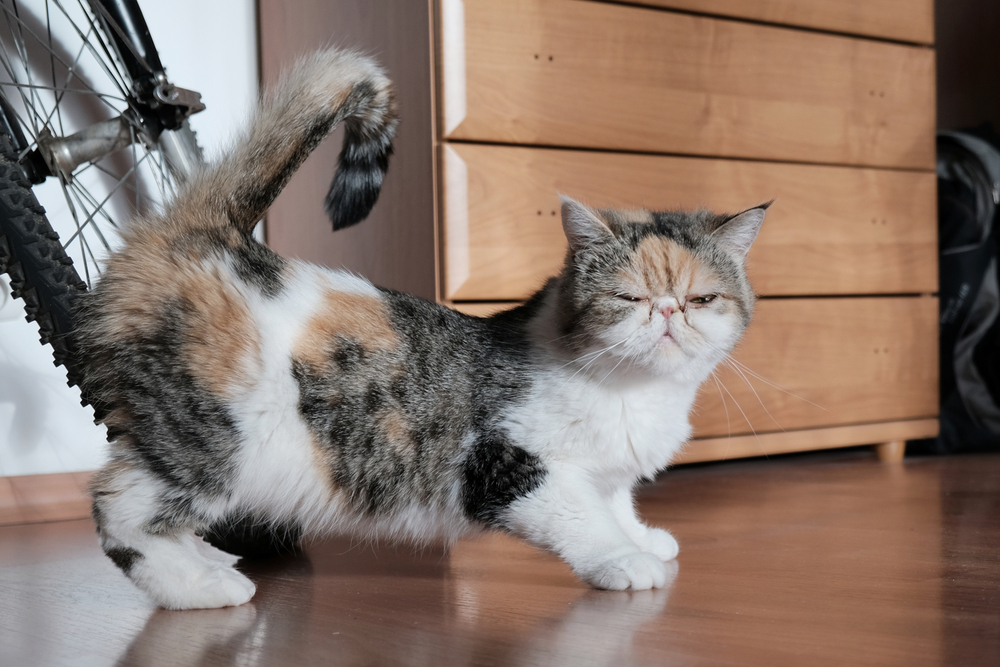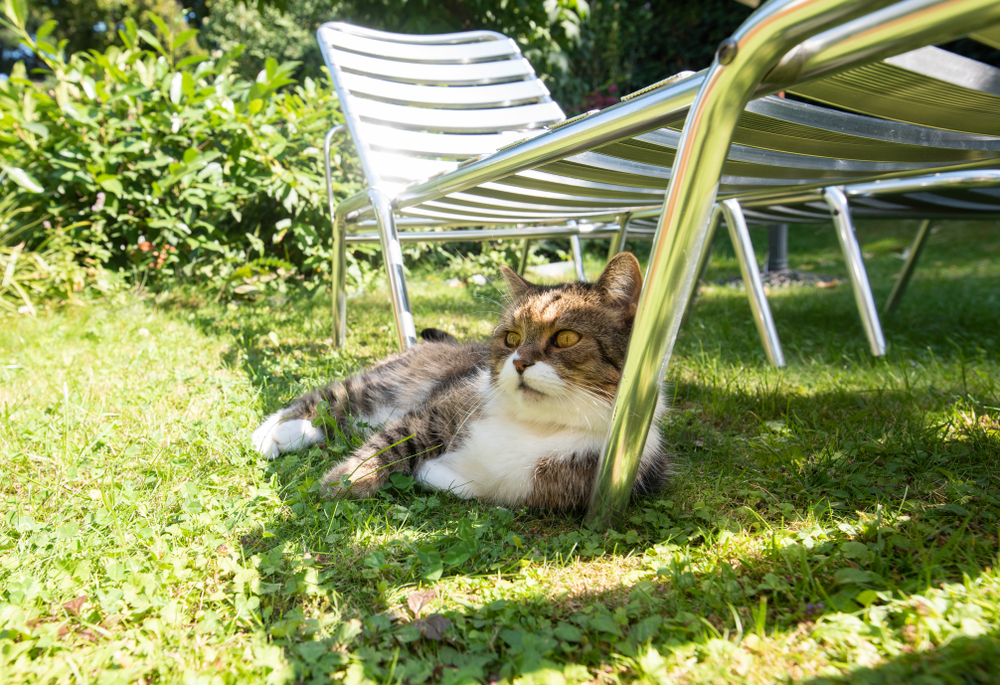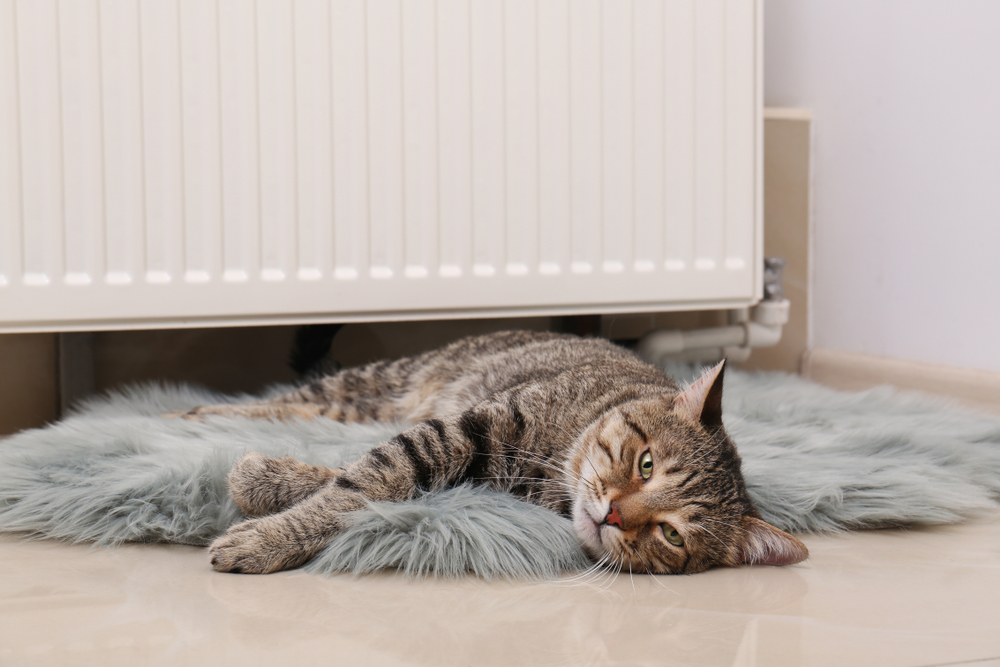Everyone who’s ever shared their home with a cat knows that feline fur babies can be a bit eccentric. Whether they’re singing the song of their people or sleeping in unusual positions, cats are notorious oddballs. But if your typically quiet cat suddenly prowls the house vocalizing, you might be wondering what’s going on with your fur baby.
While sudden changes in behavior can be alarming, if you have a female cat, you could be dealing with your standard cat in heat behavior. We’ll fill you in on what you can expect from your cat while she’s in heat—from the behavioral quirks you should look for, to how long she’ll stay in heat.

How do I calm my cat when she’s in heat?
Though the age of onset can vary, in most cases cats reach sexual maturity when they’re around 6 months old. Certain small breeds might experience their first heat between 4 and 5 months of age, while larger cat breeds—and some long-haired breeds—may not experience a heat cycle until they’re around 14 months or older. Once a cat has reached sexual maturity, she’ll be able to have her first estrus cycle, also known as going into heat. Unless your cat has been spayed or is currently pregnant, she’ll have her heat cycle at some point. She may withdraw from your affectionate gestures or she could become more demanding of your attention than ever. Fortunately, there are ways you can help her feel more settled while she’s in heat.
- Give her some space: If you have male cats in the house, keep them separate while your female cat—also known as a queen (a fitting name, we might add)—is in heat.
- Make sure your cat is safe: You’ll also want to keep your fur baby inside the house while she’s in estrus. Because your cat is receptive to mating during estrus, she could easily wander off and get lost while in search of a mate.
- Help her feel more relaxed: While many cats wail during heat, there’s no cause for worry. Your fur baby isn’t in pain; she’s calling out because she wants to attract a mate. But just because your cat isn’t uncomfortable doesn’t mean she isn’t feeling restless. Try giving her some catnip or using a pheromone diffuser to help her feel settled and calm.
Your cat might not be as interested in food during her heat cycle, but when her appetite is low, you should make sure she has access to cool, clean water. Conversely, some cats might experience an increase in appetite during estrus. Just like people, cats have their own distinctive personalities, so heat behaviors can vary.

What are the side effects of a cat in heat?
Even a cat who’s usually serene and affectionate may exhibit strange behavior during her heat cycle. Potential side effects include:
- Loud vocalizations
- Urination outside the litter box
- Crawling low to the ground
- Rolling around on the floor
- Changes in appetite
- Restless behavior, such as pacing or the inability to settle down
- Increase in affectionate behavior; some cats may even rub up against furniture
- Suddenly wanting to spend time outside
- Walking with her tail straight up in the air or tucked to one side
- Swollen genital area, potentially with very light bleeding
- Increase in grooming, particularly the genitals
All of these behaviors are perfectly normal for cats while they’re in heat. It can be alarming to hear your cat wailing at the top of her lungs or suddenly rubbing up against a table leg, but the only way to permanently put a stop to your cat’s eccentric behavior during heat is to have her spayed.
How long does a cat stay in heat?
Did you know that feral and stray cats typically don’t go into heat during the colder months? However, domestic cats live in artificially warm homes, so your fur baby can easily go into heat every 2 to 3 weeks, all year long—even during the winter. Unless your cat mates during her heat cycle, she’ll remain in heat for an average of one week, though that can vary widely in different cats. Some cycles may last as short as 2 days, while others can stretch on for an impressive 19 days.

It’s best to spay
Unless you intend to breed your cat, you may want to consider having her spayed. Not only will spaying your cat eliminate her unsettling heat-related behaviors, but it will also make her much less likely to run away from home. Lastly, spaying your cat can prevent health problems from developing later in life, which is undeniably the most important reason to consider spaying your fur baby.
Editors' Recommendations
- Wondering why cats chirp? Fascinating reasons why your cat chirps at birds (and you)
- How to cat-proof your balcony before the unthinkable happens
- There’s a totally normal reason cats throw up after eating grass – here’s why
- When can kittens leave their mom? Don’t separate them too early
- When do kittens’ eyes change colors? The answer is so cool – here’s what to know




